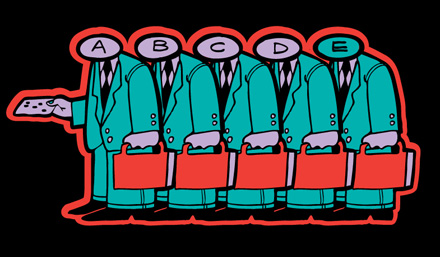
Computer Embellished Drawing
Here’s everything you never wanted to know I knew about the American education system. Read it over and submit a three-page report by Tuesday.
 Comments Off on School Daze Comments Off on School Daze

16 years ago, a silly little 7th grade student made this silly little doodle of me as a teacher/crime boss. Now he’s a power lifter who taught me more, in three paragraphs, than I learned in grad school.
“Poor is the pupil who does not surpass his master.” – Leonardo da Vinci
Rhetoric, Reasoning, and Critical Thinking used to be taught as part of primary education, the obvious basic foundation for any further study. Those fundamental intellectual dimensions are now circumvented almost entirely, and it’s reflected in our society {see my art teacher/philosopher friend Todd Marrone’s The Necessity for Metamorphosis in the American Education System.
You should not have to explain to an adult, for example, what a “straw man” or “ad hominem” argument is in order to assert that their argument is guilty of it {to call bullshit in Murica terms}, but that is in fact the case. The ability for most adults to think in an independent, methodical, fluid, goal-directed manner is ABSOLUTELY CRITICAL to the health of a complex society. Not having this capacity is crippling to the development of practical intelligence and functioning, and results in susceptibility to the cookie-cutter, follow-the-leader, groupthink bullshit that tragically characterizes our culture.
Modern politics in particular relies entirely on mass ignorance of basic reasoning as well as a carefully-cultivated public gullibility. It takes only the most basic, straightforward, motive-conscious, loose detective work to plainly see that the government is controlled by an oligarchy of bankers, but this is sadly beyond the ken of the average citizen, because they have not been taught or encouraged to think for themselves. They’re assured that it’s a simple case of Donkeys vs. Elephants and that’s it. I’ll go as far as to say they’re deliberately prevented to think critically, because that’s dangerous. As long as they can blame everything on the opposing political party, everything makes sense to them and they’re limited to aimless, irrelevant bitching. Think for yourselves.
 Comments Off on Connections Comments Off on Connections
How special do middle school students think their “specials” are? Well, take a look at some of the opinions shared by 7th grade students (names have been changed to protect the brilliant).
 2 Comments » 2 Comments »

Computer Embellished Drawing
Here’s a graphic that I made for last spring’s TEDx presentation, There’s Not One Correct Answer. The image and speech is closely aligned with my recent yammering about high-stakes standardized tests and the state of our state’s Department of Education Stagnation. If you think it would make a lovely tee shirt, drop me a line and we’ll figure out how to make lovely tee shirts out of it.
In doubly-related news, my shirt-printing, music-making pal, “Handsome” Ron Foligno, cooked up a song in the same vein.
 Comments Off on Bubbleheaded Comments Off on Bubbleheaded
Fellow Hill Dwellers,
I hope you don’t mind that I join the conversation regarding the proposed cutbacks of art, music, PE and foreign language at Belmont Hills (and other elementary schools). I’m the 7th grade gifted teacher at Welsh Valley Middle School Prior to that, I served as an art teacher for 15 years. I’m also an artist, designer, homeowner and father of two. My oldest will be heading to BH this fall. Consequently, I’m very invested in the issues that you’re concerned about and appreciate the community’s rally of support. My wife was in attendance last evening and mentioned that a recurring, unanswered, question continuously popped up; “Why is this happening?” (more…)
 8 Comments » 8 Comments »
Cassandra Seltzer • The Harriton Banner • May, 2013
I went back to middle school. On purpose. Not just any middle school, but the very halls in which I lived out my sixth-to-eighth grade career. And what did I do? Observe other, smaller, people live out their sixth-to-eighth grade careers. I followed my former art teacher (now the ‘gifted’ teacher for seventh graders) around, migrating from class to class on a mission. The man formerly known as “art teacher Todd Marrone” has a proposal: revamp the state of classroom education to motivate kids to care about their learning. Tall order.
Marrone writes of an alternative plan for student motivation, saying, “If an individual is not interested, invested and/or personally accountable for achieving a goal, he or she will only move forward under the immediate supervision and intimidation/encouragement of someone who is. [This] model is an inefficient use of resources, shortsighted and unauthentic. The moment the supervisor is removed from the equation, the motivation dissipates.” Ironically, he brought me in as a kind of “supervisor” to observe his teaching, to take notes and realize possible alternatives. (more…)
 Comments Off on I Went Back to Middle School Comments Off on I Went Back to Middle School
As outlined, I contend that the current American education system is embarrassingly unaligned with the anticipated needs of its future citizens. This is not the fault of teachers, unions, administrators, community leaders, parents nor, least of all, young people. This is the fault of time and the system’s inability (and/or lack of significant motivation) to make decisions based on foresight, innovation and progress instead of tradition. It’s time to stop pointing fingers at one another and begin to work together to prepare young people for the Information Age in a realistic, relevant, authentic way.
Intrinsic motivation has infinite advantages over extrinsic motivation. If an individual desires to achieve a goal, that individual will use all of his or her available resources in a pursuit to realize that goal. If, however, an individual is not interested, invested and/or personally accountable for achieving a goal, he or she will only move forward under the immediate supervision and intimidation/encouragement of someone who is. The latter model is an inefficient use of resources, shortsighted and unauthentic. The moment the supervisor is removed from the equation, the motivation dissipates.
I believe, and am willing to prove, that a group of young people can and will achieve great things when intrinsically motivated and held accountable for one another’s success and happiness. How? (more…)
 22 Comments » 22 Comments »
INTRODUCTION
Before a successful decision can be made in any field, one must first define success and defend the criteria for the evaluation of that success. The seemingly obvious task of education is to prepare a young person for a successful adulthood. This, of course, begs the question what is successful adulthood? Psychologists, philosophers and economists may disagree on the topic of successful adulthood but, for practical purposes, let’s define it as a happy, productive individual who leads a life of purpose and meaning. What that looks like, exactly, is up to the individual.
It should be the educator’s and/or educational system’s task to prepare a young person for a successful adulthood by moving them towards that ultimate goal with the greatest level of efficiency, to maximize the quality of their investment of time and energy, and to flexibly nurture choice and diversity, dependent on the individual’s interests and aptitudes. Our current system does neither. (more…)
 3 Comments » 3 Comments »
|




 Entries (RSS)
Entries (RSS)